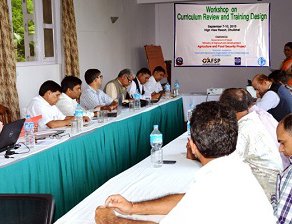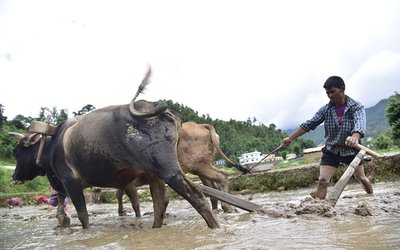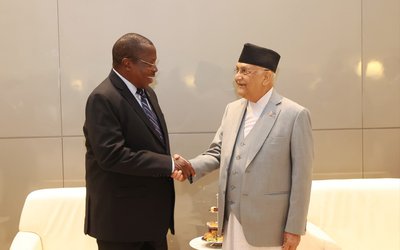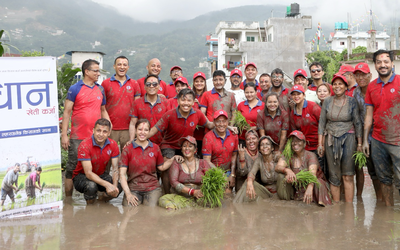
At a time when Nepal’s agriculture sector is making efforts to modernize its entire practices, Agriculture Organisations of the United Nations (FAO) has come up with new programs.
With an aim to modernize Nepal’s agriculture system, Ministry of Agricultural Development (MoAD) and the Food and Agricultural Organization of the United Nations (FAO) have been jointly organizing various programs.
Recently, it organized a 3-day Trainers’ Training for Auditors and Inspectors for Good Agricultural Practice Scheme on 15-17 September 2015 in Dhulikhel.
Good Agriculture Practices (GAP) is a voluntary standard for food safety, quality control, environment friendly and worker welfare friendly standard which ultimately contributes for sustainable agriculture.
GAP is a collection of principles to apply for on-farm production and post-production processes, resulting in safe and healthy food and non-food agricultural products, while taking into account economic, social and environmental sustainability.
Nepal along with Bhutan and Maldives is getting ready to implement GAP in the common ground of SAARC GAP on fruits and vegetables. India,Thailand and Philippines have already implemented their own GAP Standards.
GAP is a set of mainly consumer driven standards which is designed to contribute in trade facilitation, ensure food safety and workers’ welfare.
Officials from Ministry of Agricultural Development, Department of Agriculture, Department of Livestock, Department of Food Technology and Quality Control, Plant Protection Directorate and Soil Management Directorate and District Agriculture Development Offices of Kavrepalanchok and Dhading participated in the training. The course has covered the recently developed Nepal GAP Scheme including four different modules- Food Safety Module, Product Quality Module, Environmental Management Module and Worker Health, Safety and Welfare Module.
As the training is to teach the international standards, the training has covered the ISO 19011, ISO 17065, ISO 17021 and ISO 17025. However, more focus has been given to ISO 19011.
The trained persons are expected to become auditors for Nepal GAP Scheme after adoption of the Standards by Government of Nepal and the start of their implementation.
“I would like to request all of you to participate and be pro-active in your respective fields, focusing on your crucial role for successful implementation of Nepal GAP,” said Uday Chandra Thakur, Joint Secretary at Ministry of Agricultural Development.
Pointing out the increasing health and food safety concerns, he said that implementation of GAP has become essential to protect consumers from food related diseases.
FAO, on request of some countries of SAARC, is implementing a regional project on “Development of Standards and Scheme for Good Agriculture Practice (GAP) Implementation and Certification in countries of SAARC” under which it has developed a common set of standards, SAARC GAP, for the horticulture sector as a basis for GAP in the region along with criteria for certification based on international requirements. This SAARC GAP Scheme which has been developed as a regional scheme can then be adopted as such or adapted by countries to suit their needs.
Ministry of Agricultural Development (MoAD) and the FAO jointly organized the National Stakeholders consultation workshop on Good Agriculture Practice (GAP) scheme for Nepal with an objective to focus on the “Development of Standards and scheme for Good Agriculture Practice (GAP) implementation and certification in countries of SAARC”.
Similarly, FAO technical assistance to AFSP has organized a four-day curriculum review and training design workshop from 7-10 September 2015 in Dhulikhel.
Food and Agriculture Organization (FAO) of United Nations in Nepal is providing technical assistance (TA) to Agriculture and Food Security Project (AFSP) of the Ministry of Agricultural Development (MoAD) and Ministry of Health and Population (MoHP), Government of Nepal, since 22 January 2014.
AFSP is a multi-sectoral project funded by Global Agriculture Food Security Project (GAFSP) and supervised by World Bank. AFSP has been implemented in 19 mid-hill and mountain districts of the Mid-western and Far-western Development Regions of Nepal. The project is designed to enhance the food and nutrition security of targeted communities. Farmer Field School (FFS) is the key approach adopted in this project for bringing interventions to grass-root level beneficiaries.
According to a press release issued by FAO, one of the key tasks of FAO-TA is to review and develop curriculum, manuals, guidelines and materials for FFS to impart knowledge and skills related to crop, livestock, nutrition and livelihoods. TA team has designed curriculums of Master Training of Trainers for facilitators of FFS and has prepared guidelines, manuals and learning materials for conducting FFS. Based on those curriculums, two events of MTOT and 5 events of F-TOF have already been carried out.
Welcoming the participants, team leader of FAO-TA Dr. Braja Kishore Prasad Shaha highlighted the rational and objectives of the workshop.
In his key note speech, Shyam Prasad Poudyal, the Project Director of AFSP, focused on the way forward for improvement in ToF and FFS design and curricula.
The Training Specialist of AFSP, Dr. Ratna Kumar Jha coordinated the workshop and facilitated the working groups to come up with comprehensive outputs.
Three papers were presented in the closing session chaired by Dr. Rajendra Prasad Adhikari, Joint Secretary of MoAD. Crop Director of Nepal Agriculture Research Council Dr. ShambhuKhatiwada and Deputy Director General of Department of Agriculture Beni Bahadur Basnet provided their critical comments, opinions and suggestions on the curriculums and modules presented during the closing sessions.
- MELAMCHI WATER SUPPLY: No Interruption During Monsoon
- Jun 25, 2025
- KOREAN RETURNEES: Successful Integration
- Jun 25, 2025
- UPPER TRISHULI-1: Engaging With Local
- Jun 25, 2025
- IME GROUP: Twenty Five Years Of Journey
- Jun 24, 2025
- NEPAL’S AIR POLLUTION: A Growing Health Concern
- Jun 24, 2025















